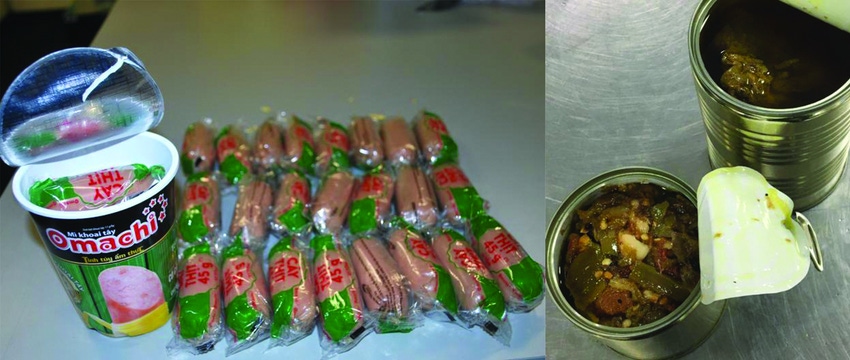CBP agriculture specialists seize 25 noodle cups with pork sausage inside, nine pop-top cans with beef.
February 13, 2020

U.S. Customs and Border Protection agriculture specialists continue to intercept potential threats to our nation's agricultural resources in traveler baggage at Washington Dulles International Airport.
The following is a summary of recent interceptions:
During a secondary examination on Jan. 28, a traveler from Vietnam declared that he possessed cup noodles. CBP agriculture specialists noticed that the lids of each of the 25 noodle cups were opened and inside discovered a combined 2 pounds, 8 ounces of prohibited pork sausages. The traveler was destined to an address in Montgomery County, Md.
CBP agriculture detector dog Beazley was alerted to the baggage of a traveler from Tunisia who arrived on a flight from Germany on Jan. 25. Inside the baggage, CBP agriculture specialists discovered one pound of prohibited rice and nine unlabeled pop-top cans that contained 4.5 pounds of prohibited beef products. The traveler was destined to an address in Fairfax County, Va.
During a secondary baggage examination of a U.S. citizen who arrived from Japan on Jan. 6, CBP agriculture specialists discovered three live Jasmin bonsai trees that the traveler stated were from his deceased father's residence. CBP agriculture specialists turned the plants over for quarantine to a USDA plant inspection station Feb. 7. The traveler was destined to an address in Prince George's County, Md.
The prohibited pork and beef products were incinerated as they posed a potential animal disease threat to our nation's livestock industry.
The Bonsai trees with root balls were quarantined to protect against insect pests dangerous to U.S. plant and tree industries, and other organic organisms that could potentially rest in the soil with the root ball.
"These cases are a microcosm of what Customs and Border Protection agriculture specialists encounter every day in traveler baggage at our nation’s ports of entry," says Casey Durst, director of Field Operations for CBP's Baltimore Field Office. "Customs and Border Protection agriculture specialists continue to exercise extraordinary vigilance every day in their fight to protect our nation's agricultural and economic prosperity from invasive pests and animal diseases."
CBP agriculture specialists recently intercepted a bag of pet food from China that consisted of many tiny dead birds. The prohibited birds were incinerated as they posed a potential threat of carrying avian influenza.
CBP agriculture specialists perform a critical border security role in safeguarding America's agricultural and natural resources from harmful pests and plant diseases. They have extensive training and experience in the biological sciences and agricultural inspection, inspect tens of thousands of international air passengers, and air and sea cargoes nationally being imported to the United States.
During a typical day last year, CBP agriculture specialists across the nation seized 4,695 prohibited plant, meat, animal byproduct, and soil, and intercepted 314 insect pests at U.S. ports of entry.
Source: U.S. Customs and Border Protection, which is solely responsible for the information provided, and wholly owns the information. Informa Business Media and all its subsidiaries are not responsible for any of the content contained in this information asset.
You May Also Like



